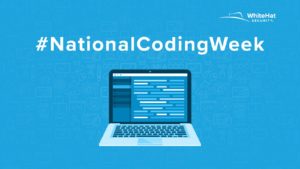Q&A with Senior Software Engineer Ruth Iverson

21st September 2018
Guest blog for National Coding Week kindly provided by WhiteHat Security

Now in its fifth year, National Coding Week has gone from strength to strength. Founded in the UK to help people improve their digital literacy and aiming to fill the growing IT skills gap, it is now a truly global event with huge amounts of interest from the press and exposure across social media platforms.
To mark this year’s National Coding Week, we catch up with Ruth Iverson, a senior software engineer at WhiteHat Security, to learn how she got into software engineering and what skills are needed to succeed as a coder. She also offers some advice to women looking to get into the business:
How did you get started as an engineer?
Walking backwards a bit, I’ve been at WhiteHat Security for about seven years. Today, I work in engineering as a software engineer, which is more than just coding, although that is a large part of the job. Prior to coming to WhiteHat Security, I worked for several other organizations, including six years at NASA Ames Research Center in Mountain View, focusing on C language and systems work.
It was in high school that I was first introduced to computers and coding. Back then, we had one 300-baud dial-up modem and four teletype machines in our small lab at my school. I learned Fortran IV as my first coding language. I found computer programming hugely interesting and was hooked immediately!
Looking back, that may seem surprising because although I loved science, I didn’t care all that much for mathematics. But I do think this is a good lesson to convey to anyone thinking about entering the technology business, since not having a strong math background is perceived by many people as a barrier to entry. That’s just not true.
Despite that initial interest, I didn’t go into computer science in college. Instead, I majored in music. That sounds like quite a different direction, but over the years, many people in the tech industry have suggested that musicians actually make good coders as they can pair an analytical, logical and disciplined mind with creativity and originality.
How do you actually use coding in your job?
These days, I’m on the frontline of the development side at WhiteHat Security, with a strong focus on customer success. The team I am on does a lot of bug hunting. We move quickly to implement solutions for problems that can be real pain points for customers. We also focus on a lot of feature enhancements, such as updates to critical UIs and APIs. Right now, my team and I also work on a lot of SQL – fixing database issues that sometimes occur and adding new functionality.
What skills are required to be a successful coder?
You have to have a sense of curiosity and a desire to know how things work or why they fail – even down to the smallest detail. It also helps to have a love of fixing problems and the tenacity to solve them. Most importantly, you need to be a team player. Many times, the solution you’re looking for is found through shared ideas and collaboration. That’s another myth that needs to be busted; coders are thought of as solitary people, but being a strong communicator and being able to work in a group are absolutely key.
What advice would you give to younger women interested in a career in STEM?
If you like working with computers and technology, and enjoy seeing results of the code you write, go for it! Also, don’t be intimidated by men in the field – it’s an industry that’s still male dominated, so you have to be strong enough to push when you know you are right and be sufficiently open to accept valid feedback when you are wrong or struggling. The good news is that the number of female coders is increasing each year, which is hugely inspiring. And there are strong peer support groups including Girls Who Code that organize regular meet-ups. This is a great way to meet like-minded people and build a network.
How do you avoid stress to achieve a work-life balance?
In most cases, make sure that you take your weekends off and don’t work. Give your brain a break and do something completely different. I confess I don’t always listen to that! But please try to take those precious couple of days to breathe and do the things that are important to you outside of the office.